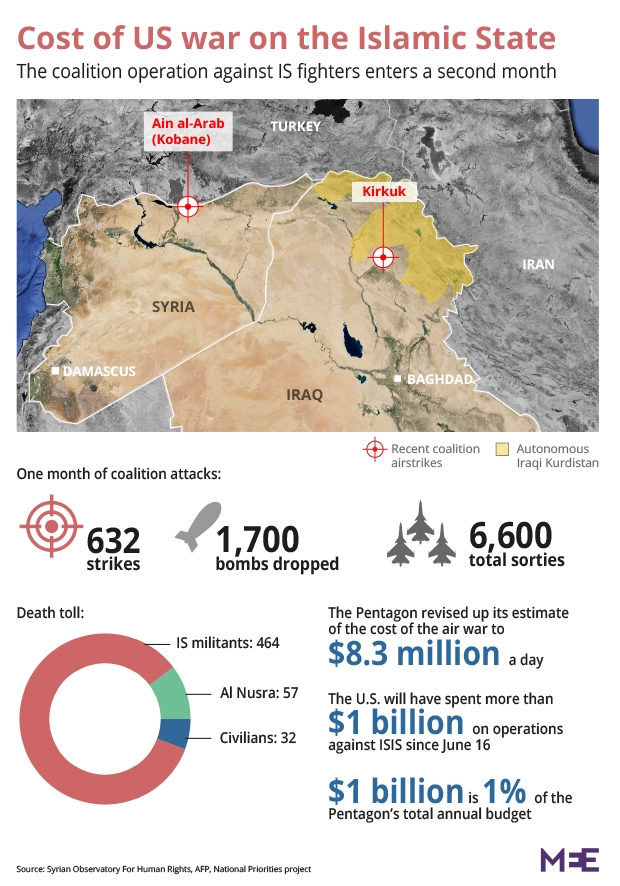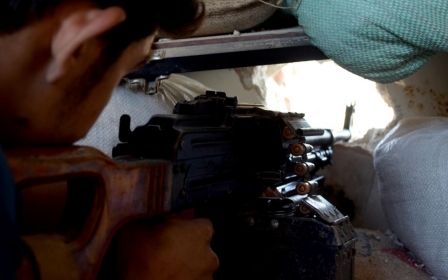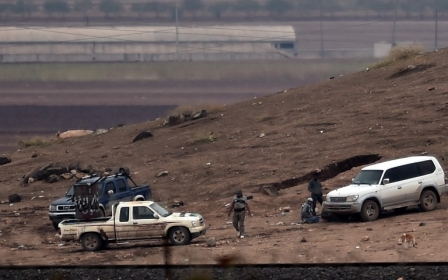Military aid to Kobane continues via Turkey border

Heavily armed Iraqi peshmerga forces reached the Turkish border Thursday and a first group entered the town of Kobane as they prepared to join fellow Kurds battling the Islamic State (IS) group.
The group of 10 fighters briefly entered Kobane to coordinate with local Kurdish militia who have been holding off an assault by IS militants for six weeks, a monitoring group said.
Turkey's Firat news agency said they returned to the town of Suruc on the Turkish side of the border after discussions over the logistics of the peshmerga and the weapons crossing the frontier.
A peshmerga convoy reached Suruc Thursday after travelling through southeastern Turkey along roads clogged with flag-waving Kurds, an AFP photographer said.
There it linked up with a second group of peshmerga who had flown in Wednesday, but it was unclear when the main force would cross into Kobane.
Officials have said there are about 150 peshmerga fighters in total, armed with machineguns, heavy artillery and rocket launchers.
The IS militants were pounding northern areas of Kobane along the border with mortars and heavy artillery, a monitoring group said, in an apparent bid to prevent the peshmerga from crossing.
And they attacked a northern neighbourhood overnight but were pushed back by Syrian Kurdish People's Protection Units (YPG) militia, said the Britain-based Syrian Observatory for Human Rights.
"The bombardment of the border area will likely delay the entry of the peshmerga" into Kobane, said Observatory director Rami Abdel Rahman, who relies on a wide network of sources inside Syria.
A US-led coalition carrying out air raids against IS has intensified attacks near Kobane, and the Pentagon said its warplanes made 10 strikes in the area on Wednesday and Thursday.
The coalition carried out two other strikes elsewhere in Syria and two in Iraq, it said.
Washington has also dropped weapons to Kobane's militants, who had received little in the way of reinforcements until now.
Turkey agreed last week to allow the peshmerga to cross its territory to Kobane.
400 FSA fighters cross into Kobane
Turkey also allowed dozens of Free Syrian Army (FSA) rebels to cross into Kobane Wednesday, but they were lightly armed.
An FSA commander told reporters in Turkey it has 400 fighters in Kobane and more on the way.
Ankara has been wary of giving support to the YPG, which has close links with the outlawed Kurdistan Workers' Party (PKK) that has fought a three-decade insurgency in southeast Turkey.
Syrian President Bashar al-Assad's government denounced Ankara for allowing them across the border.
"Once again, Turkey has shown its conspiratorial role... by allowing foreign forces and terrorist groups to enter Syria," a foreign ministry statement said.
"This constitutes a flagrant violation of Syrian sovereignty."
'Barbaric' barrel bombs
IS arose in the chaos of Syria's civil war, an uprising that has killed more than 180,000 people and forced millions from their homes in the past three-and-a-half years.
Assad's forces has been accused of committing widespread abuses in its fight against a diverse group of rebels.
Washington expressed horror Wednesday at reports Syrian government forces had dropped barrel bombs on a camp for displaced persons in the northwestern province of Idlib.
"We are horrified by the reports that the Assad regime barrel bombed the Abedin displaced persons camp in Idlib and the images we saw of the carnage against innocent civilians," US State Department spokeswoman Jen Psaki said.
"The attack on the Abedin camp was nothing short of barbaric."
The Observatory said Wednesday's attack killed at least 10 people and wounded dozens.
Hagel blasts US Syria strategy
Meanwhile, Pentagon chief Chuck Hagel has castigated the US strategy in Syria in a memo to the White House, saying Washington must explain its intentions toward Assad.
The memo was sent last week to President Barack Obama's national security adviser, Susan Rice, a defense official said Thursday, confirming a New York Times report.
Hagel warned that the Syria policy was "in danger of unraveling" due to confusion over the US stance toward Assad, the paper wrote.
The Obama administration has focused on defeating IS in Iraq first, and described US-led air strikes in Syria as a way of disrupting the militants' supply lines.
Washington also plans to arm and train a group of 5,000 "moderate" Syrian rebels, but has not committed to attacking Assad's forces that threaten moderate rebel fighters.
Some US lawmakers, analysts, retired military officers and Syrian opposition activists have heaped criticism on Obama's approach to Syria, accusing the administration of bolstering Assad's position by striking at IS without confronting Damascus.
Anthony Cordesman of the Center for Strategic and International Studies, who has often advised the Pentagon, has slammed the US policy in Syria as a "strategic mess."
New MEE newsletter: Jerusalem Dispatch
Sign up to get the latest insights and analysis on Israel-Palestine, alongside Turkey Unpacked and other MEE newsletters
Middle East Eye delivers independent and unrivalled coverage and analysis of the Middle East, North Africa and beyond. To learn more about republishing this content and the associated fees, please fill out this form. More about MEE can be found here.





